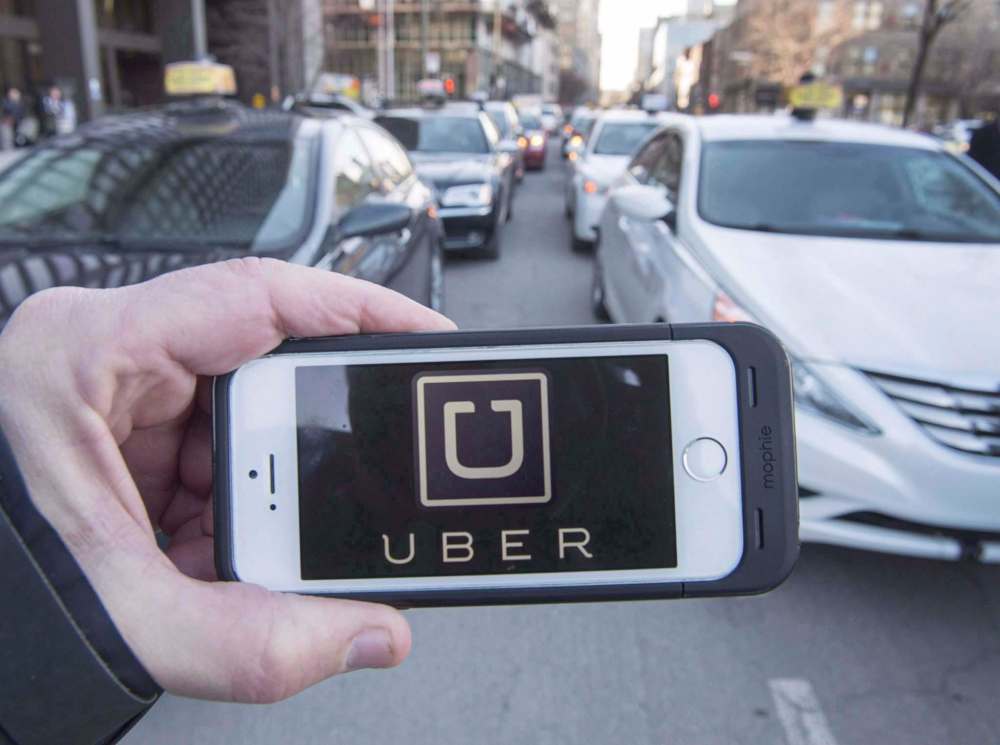Moving slow on Uber benefits Winnipeg
Advertisement
Read this article for free:
or
Already have an account? Log in here »
To continue reading, please subscribe:
Monthly Digital Subscription
$0 for the first 4 weeks*
- Enjoy unlimited reading on winnipegfreepress.com
- Read the E-Edition, our digital replica newspaper
- Access News Break, our award-winning app
- Play interactive puzzles
*No charge for 4 weeks then price increases to the regular rate of $19.00 plus GST every four weeks. Offer available to new and qualified returning subscribers only. Cancel any time.
Monthly Digital Subscription
$4.75/week*
- Enjoy unlimited reading on winnipegfreepress.com
- Read the E-Edition, our digital replica newspaper
- Access News Break, our award-winning app
- Play interactive puzzles
*Billed as $19 plus GST every four weeks. Cancel any time.
To continue reading, please subscribe:
Add Free Press access to your Brandon Sun subscription for only an additional
$1 for the first 4 weeks*
*Your next subscription payment will increase by $1.00 and you will be charged $16.99 plus GST for four weeks. After four weeks, your payment will increase to $23.99 plus GST every four weeks.
Read unlimited articles for free today:
or
Already have an account? Log in here »
Hey there, time traveller!
This article was published 23/09/2017 (2963 days ago), so information in it may no longer be current.
Sometimes, there is an advantage to being a laggard when it comes to innovations. Like Uber.
Winnipeg, for example, does not allow ride-sharing services. At least for now.
Winnipeg Mayor Brian Bowman has been not-so-subtly prodding the province to deliver on its promise to pass legislation enabling ride-sharing services such as Lyft and Uber. “Winnipeggers are telling me they want (taxi) options, they want ride-sharing services like Uber and Lyft in our city,” Bowman said this week. “I want to let all Winnipeggers know I certainly share those views, that I hear you and that I’m with you.”

Premier Brian Pallister’s government introduced ride-sharing legislation in the spring but was unable to get it to a vote. The legislation will dissolve the Manitoba Taxicab Board and empower municipalities to regulate taxi services and, if they choose, allow ride-sharing services.
Bowman added that city hall is already working diligently to prepare for the eventual proclamation of this law by conducting “jurisdictional reviews” to see how Uber is operating in other countries. That is an excellent first step.
As a laggard to the world of ride-sharing, the city finds itself in the enviable position of being able to benefit from an abundance of examples of how not to introduce ride-sharing to an urban centre.
Uber and its competitors were hailed as a tool that would reinvent transportation in densely populated urban communities and provide new economic opportunities for the people who dwelled in those communities. And in many cities, it has delivered on much of what it promised. In others, however, Uber has evolved into a public policy nightmare.
Ride-sharing services have triggered political firestorms, pitting Uber contractors against traditional taxi companies. The battles between these constituencies have been political and, at times, physical.
Cities that have allowed unfettered ride-sharing have seen huge impacts on the traditional cab industry. Iconic cab companies have gone out of business, and the open-market price for licences or medallions to operate a taxi have plummeted in value in some of the world’s largest cities, leaving drivers with enormous debts that they can no longer cover.
The conflict between traditional cab companies and ride-sharing contractors has prompted some countries, such as Italy, Bulgaria, Denmark, Australia and Japan, to ban some or all of Uber’s services and other similar apps. In others, Uber has been subjected to huge fines for operating in defiance of existing regulations and engaging in unfair competitive practices. And in some locales, Uber drivers have successfully sued to be paid as employees, not contractors.
And in a two-day stretch this past week, Uber was dealt significant blows in both the Netherlands and the United Kingdom.
In The Hague, an appeals court upheld a government ban on one of Uber’s ride-hailing services — UberPop — which allowed drivers without taxi licences to pick up passengers. Other Uber services do operate in the Netherlands, but drivers must be licensed to drive a taxi.
And in a separate decision, Transport for London (TFL), the city’s transportation authority, announced it would not renew Uber’s licence to operate. TFL said that “Uber’s approach and conduct demonstrate a lack of corporate responsibility in relation to a number of issues which have potential public safety and security implications.” That decision is seen as a huge victory for traditional cabbies, who have fought stridently against any form of independent ride-sharing.
What do all these disputes tell us about the impact of ride-sharing services? First and foremost, that if you don’t do it right, there will be years of angry, bitter consequences and confusion.
On a recent trip to the U.K., I got a first-hand look (sort of) at the good and the bad of ride-sharing. Given that Winnipeg doesn’t yet allow Uber, I downloaded the app before leaving for London with the expectation that this would be my first concerted Uber experience.
In London, I tried several times to hail Uber cars with my smartphone, but was turned away every time by a bug in the authorization process. Although my Uber account had been created, and my credit card logged, the app would not allow me to order a car. A quick check with the Google machine revealed that this was not an isolated problem. I made several pleas to Uber’s customer service department, but with no resolution.
In Dublin, Ireland, however, I struck Uber paydirt.

The app worked perfectly, and like many hard-core Uber aficionados, I had a ball watching the little car work its way towards my hotel. However, when the car finally arrived, I was surprised to see that it was a licensed, labelled taxi.
The driver told me that anyone who drives for Uber must be licensed as a taxi driver. In some communities, where the taxi industry vigorously limits the number of taxi licences, this would be a huge problem. However, Ireland deregulated the taxi industry more than a decade before Uber was even created. Now, drivers have the option of taking calls through the taxi dispatch or through the Uber app.
This scenario is, however, confusing for the consumer. I tried to deduce from reviews and online comments which option was less expensive — Uber or regular taxis. In cities like London and New York, Uber fares are substantially lower. In Dublin, it seemed that there was no clear consensus on which had the lower rates.
Other than one small problem with a driver who inflated a fare without my consent, my Uber experience was enjoyable. Although you can’t hail an Uber car from the street, the ability to order the car through the app and then wait inside, away from the driving Dublin rain, was welcomed. Standing on a street corner waving my arms at passing cabs is not my favourite part about going out on the town.
What does this small anecdotal experience say about Uber? Only that we in Winnipeg really need to study the positive and negative experiences in other cities and come up with a better model. It seems that none of the communities that were early adopters of ride-sharing got it quite right.
Total deregulation is likely not an option, as it would severely erode the investments made by existing cab companies and drivers in licences. Although the cost of a licence has not risen to London or New York levels — an auction last year of a Big Apple taxi licence fetched $1.3 million — it can still cost hundreds of thousands of dollars to acquire a Winnipeg licence through a private sale. Winnipeg’s new ride-sharing system must make appropriate steps to protect some of the value of those licences.
However, existing cab drivers must also acknowledge that there needs to be more taxis or ride-sharing cars on city streets to serve the needs of an increasingly busy downtown and a growing urban population.
It’s also reasonable to expect ride-sharing drivers to obtain some sort of licence. That is one of the only ways the city can ensure ride-sharing is safe, and that there is a reasonably level playing field with licensed taxis.
The introduction of ride-sharing to Winnipeg will inevitably bring significant, disruptive change. That can be a good thing, but only if we learn from the mistakes made by other cities and devise a more perfect marriage between traditional taxis and ride-sharing contractors.
dan.lett@freepress.mb.ca

Dan Lett is a columnist for the Free Press, providing opinion and commentary on politics in Winnipeg and beyond. Born and raised in Toronto, Dan joined the Free Press in 1986. Read more about Dan.
Dan’s columns are built on facts and reactions, but offer his personal views through arguments and analysis. The Free Press’ editing team reviews Dan’s columns before they are posted online or published in print — part of the our tradition, since 1872, of producing reliable independent journalism. Read more about Free Press’s history and mandate, and learn how our newsroom operates.
Our newsroom depends on a growing audience of readers to power our journalism. If you are not a paid reader, please consider becoming a subscriber.
Our newsroom depends on its audience of readers to power our journalism. Thank you for your support.



